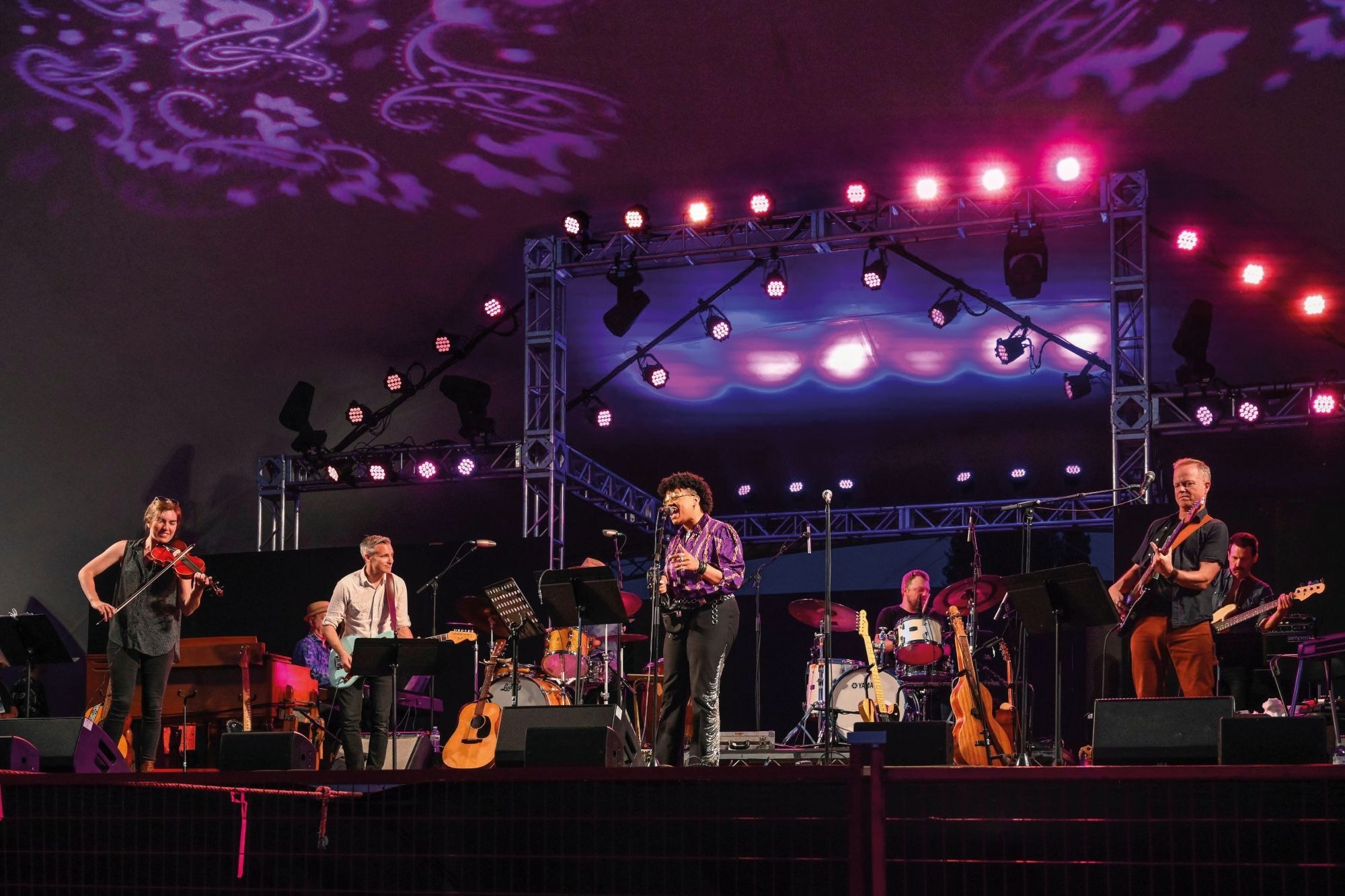Country music has long shed its Bible-bashing image. Today, bluegrass is helping to heal America’s deep divides

On 15 November 1969, the legendary bluegrass banjo player Earl Scruggs sent shockwaves through the Nashville music establishment by playing at a half-million strong protest to end the Vietnam War. Country music was a conservative stronghold, and Earl was one of its few stars to speak out publicly against the conflict.
His decision to take part in the Moratorium to End the War in Vietnam would not have been taken lightly. But Earl – a shy, unassuming guy from rural North Carolina – was no traditionalist. An unlikely musical visionary, he’d pushed the boundaries of the banjo in the late 1940s, transforming it from a rhythm to a lead instrument, and essentially inventing the rapid-fire and highly technical style we now know as bluegrass. As the US culture wars of the 1960s and 70s raged through Nashville, Earl never stopped innovating. He embraced the counter-culture and collaborated with the hippies, rockers and “longhairs” so derided by his peers. For him, the banjo was a tool of communication and progress.
But despite the best efforts of Earl and others since, the stereotype of bluegrass as “redneck” music remains. It’s an image problem that stems from its roots in the conservative south and the moralising Christian hymnals of rural gospel churches.
The reputation was further cemented by the 1972 movie Deliverance. The moment when the city slickers on their back-country canoe trip first come into contact with the locals – including a mentally deficient but virtuoso banjo player – represents the impending culture clash that defines the film, culminating in a terrifying campaign of violence, sodomy and death. This is probably the biggest PR disaster any musical instrument has ever experienced (please, no more “Paddle Faster, I Hear Banjos” memes).
In reality, bluegrass has spread over the decades to encompass the entire political and cultural spectrum of the United States, with strong scenes cropping up in traditionally liberal enclaves, a growing awareness of black bluegrass musicians, and an annual Bluegrass Pride event in San Francisco. But today, America’s increasing divisions pose a new challenge. I worry that it will undermine the unique ability of bluegrass to bring people together.
None of this was on my mind when I bought my first Flatt & Scruggs album as a teenager in Bristol (the English city, rather than the one in Tennessee, to my dismay). I had no cultural connection to the genre, but was captivated by its incongruous mix of hard-driving energy and plaintive close harmonies, singing stories of homesteads and heartbreak in faraway mountains. It was only when I ventured to my first bluegrass festival that I discovered the unique feature of this music – almost everyone who is into it, plays it. I bought myself a banjo.
Soon, I was joining in with my fellow festival-goers, who were there just as much for the jam sessions and workshops as for the bands. Weekend or week-long bluegrass “camps”, where hundreds of players come together to learn from the masters, are an American phenomenon that has spread across Europe and the globe in the last couple of decades. The simple chord structures and the repertoire of standards mean you can show up at a session anywhere in the world and join in. Established scenes exist from France, Spain and Portugal to Japan, Thailand and Australia.
As the culture wars intensify, maybe playing music with people we might otherwise never encounter is exactly what we should be doing – bluegrass as a kind of soft diplomacy.
Ben Wright, a banjo player in the Chicago bluegrass band The Henhouse Prowlers, certainly thinks so. The band’s side project, The Bluegrass Ambassadors, travel across the US and the world – from Uganda to Saudi Arabia – collaborating with local musicians, running school workshops, and always learning a local folk song to include in their set.
Following Donald Trump’s reelection, Wright is concerned for the future of the Ambassadors, and not only for their funding (they were given a grant by the State Department during the Biden administration). But he’s cautiously optimistic that bluegrass can continue to play a part in working against polarisation. “Despite what you see on the news, there’s a huge swathe of Americans in support of coming together and understanding,” he says. “Music binds us all together as a species.”
John Wirtz, founder of the leading UK bluegrass camp, agrees. Sore Fingers Summer School is an intense, immersive week that takes place at Kingham School in the Cotswolds and attracts over 300 pickers of all ages and abilities. Many of the tutors and musicians are Americans come to teach us Brits. ‘There’s a cross-section from left to right,” Wirtz says, referring to both tutors and students, “and in some cases, rather extreme views. But one thing is for sure, music transcends these things – politics, religion, language, culture.”
And bluegrass continues to evolve. Young stars Billy Strings and Molly Tuttle, both dazzling virtuoso guitarists with a liberal sensibility, from Michigan and California respectively, have found stratospheric fame over the last decade with original material on topics including abortion rights, gentrification and the pleasures of smoking weed. Meanwhile, black banjo player and music historian Rhiannon Giddens, who came to fame with the Carolina
Chocolate Drops, has worked tirelessly to set history straight, shining a light on the black southern musicians who inspired and played with the early bluegrassers. Recordings back then were designated as either “race music” or “hillbilly”, thereby cementing bluegrass as music by and for white people. For a long time this created a scene which felt hostile to black musicians, but the 21st century has seen black American artists such as Tray Wellington, Amythyst Kiah and Gangstagrass reclaiming its origins.
All this suggests that bluegrass’s political needle is swinging to the left. But it’s never really been that simple. Music doesn’t follow a set of prescribed political beliefs, and neither do humans. And when pickers do try to proselytise, it may not be what you expect. In 2008, for example, 81-year-old Virginian banjo legend and Baptist Ralph Stanley surprised his fellow players and fans by campaigning for Barack Obama. On the other hand, in 2019, at the ostensibly liberal Delfest in Maryland, bluegrass superstar Ricky Skaggs provoked a chorus of disgusted boos when he gave a fire-and-brimstone style sermon during his Sunday morning set. A Reddit thread on politics in bluegrass makes for an entertaining read on mixed identities, with people posting as “gun-toting, banjo-pickin’ liberals” and “gospel-loving atheists”.
New factions, new listeners and new players will continue to shape the future of bluegrass. But the basic instrumentation remains the same, as do its musical touchstones – the seminal recordings and awe-inspiring performances that drew us all to it in the first place, no matter our background. It remains to be seen if a more open and diverse bluegrass world can survive in a brutally polarised United States, or if it will split apart and divide into different strands.
Personally, I believe it will hold together. Making music with others is one of the most life-affirming, connective experiences available to human beings. This was something that Earl Scruggs instinctively understood, as do Ben Wright and his Bluegrass Ambassadors half a century later. As President Trump continues to fuel divisions in society, these shared experiences of making music with others – all kinds of others – feels more important than ever. Bluegrass has managed to bring disparate humans together for over 75 years. I believe that those of us who play and love the music will make sure it continues to do so.
This article is from New Humanist’s Autumn 2025 issue. Subscribe now.

